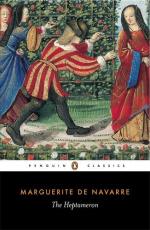3 Epilogue of Tale xlvi.
In reference to this subject of conjugal fidelity a curious story is told of Margaret. One day at Mont-de-Marsan, upon seeing a young man convicted of having murdered his father being led to execution, she remarked to those about her that it was very wrong to put to death a young fellow who had not committed the crime imputed to him. It was pointed out to her that the judges had only condemned him upon conclusive proofs and the acknowledgments that he himself had made. Margaret, however, persisted in her remark, whereupon some of her intimates begged of her to justify it, for it seemed to them at least singular. “I do not doubt,” she replied, “that this poor wretch killed his mother’s husband, but he certainly did not kill his own father.” (1)
Besides being unfortunate as regards her husbands, Margaret was also denied a mother’s privileges. She experienced great suffering at her confinements, (2) and on two occasions she was delivered of still-born infants of the female sex.
1 Gabriel de Minut’s
De la Beaute, Discours divers, &c.,
Lyons, 1587. p. 74.
2 Nouvelles Lettres de Marguerite, pp. 84 and 93.
She had centred many hopes upon her little boy, John, of whom she was confined without accident, but he died, as already stated, in infancy, and this misfortune was a great shock to her, though she tried to conceal it by having the Te Deum sung at the funeral in lieu of the ordinary service, and by setting up in the streets of Alencon the inscription, “God gave him, God has taken him away.” However, from that time forward she never laid aside her black dress, though later on she wore it trimmed with marten’s fur. Her best known portrait (1) represents her attired in this style with the quaint Bearnese cap, which she had also adopted, set upon her head.
1 Bibliotheque Nationale,
Recueil de Portraits au crayon,
&c., fol. 46.
Not only did Margaret lose her son by death, but she was prevented from enjoying the companionship of her daughter Jane. Francis, who never once lost sight of his own interests, deemed it advisable to possess himself of this child, who was the heiress to the throne of Navarre. Accordingly when Jane was but two years old she was sent by the King to the Chateau of Plessis-les-Tours, where she was carefully brought up in strict seclusion.
To the fact that Margaret was never really happy with either of her husbands, and that she was precluded from discharging a mother’s duties, one may ascribe, in part, her fondness for gathering round her a Court in which divines, scholars, and wits prominently figured. The great interest which she took in religious matters, as is shown by so many of her letters, (1) led her to shelter many of the persecuted Reformers in Beam; others she saved from the stake, and frequently in writing to the King and Marshal de Montmorency she begs for the release of some imprisoned heretic.




